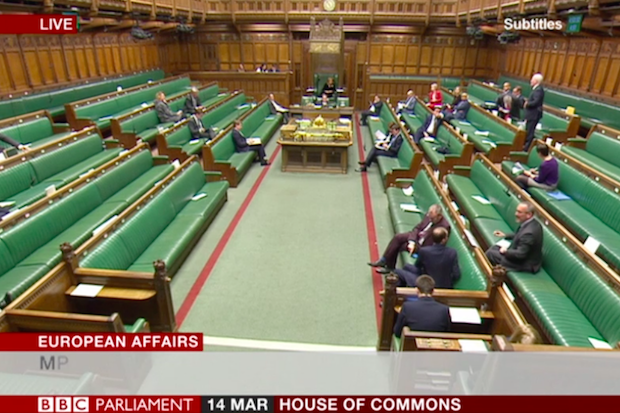After PMQs today, Theresa May will give a statement on Russia – and the government’s proposed response to the attempted murder of a former Russian double agent on British soil. Then there will be a ten minute rule motion on ‘supervised drug consumption facilities’ and after that a ‘general debate’ will commence on European Affairs. This will run on through the afternoon until 7pm – and should any MPs not have the chance to offer their two cents worth, they need not fear as there is a second day of general debate planned.
Given that it’s now 380 days until Britain leaves the EU, you’d be forgiven for thinking there may be a better way for MPs to be spending their time. After all, the statute book could hardly be described as ‘Brexit-ready’ right now. As research this week highlighted, this government has a big problem when it comes to legislation. In fact, it’s the most inactive government for at least two decades, with the number of votes held in the nine months since the general election – traditionally when a government enacts its vision – lower than after each of the elections won by David Cameron or Tony Blair.
Without a sizeable majority, the government isn’t able to get much through – whether domestic or Brexit-related. The majority of the Conservatives’ 2017 manifesto has had to be binned and the threat of rebel Brexit amendments is proving so troublesome to the whips’ office that key votes keep being postponed. In this vein, the trade bill won’t be back in the Commons until May because of concern over Anna Soubry’s amendment to force the executive to keep the UK in a customs union with the EU.
However, as I say in the Guardian, it would be wrong to just blame Brexit for the government’s inactivity. It’s actually thanks to Brexit that this inactive government still spends a lot of the time looking rather active. With the various EU council meetings, Brussels negotiations, parliamentary statements on such meetings and roadmap-to-Brexit speeches, May can still be described as a busy prime minister.
It’s when there is an interval in the theatre of the negotiations that the government’s lack of domestic agenda is exposed and MPs speak out – as with Nick Boles. In any other Parliament, the lack of legislation could be enough to bring about a leadership challenge or at least ensure the government has no record to be proud of by the time of the next election. However, Brexit makes things extraordinary. Today’s general debate on European Affairs doesn’t promise to be an enlightening use of MPs’ time. But if May’s Brexit plans come to fruition, the government will still have something rather significant to show for itself by the time of the next election – even if there isn’t much legislation.







Comments